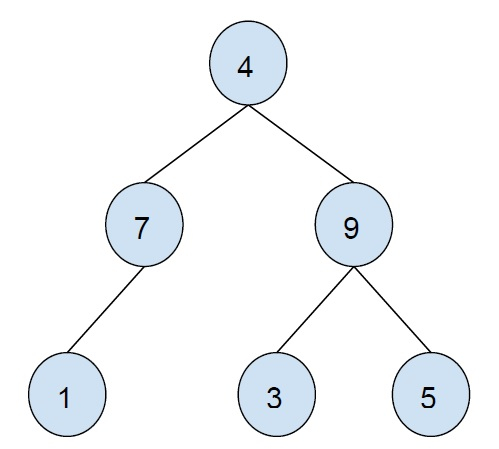
 Data Structure
Data Structure Networking
Networking RDBMS
RDBMS Operating System
Operating System Java
Java MS Excel
MS Excel iOS
iOS HTML
HTML CSS
CSS Android
Android Python
Python C Programming
C Programming C++
C++ C#
C# MongoDB
MongoDB MySQL
MySQL Javascript
Javascript PHP
PHP
- Selected Reading
- UPSC IAS Exams Notes
- Developer's Best Practices
- Questions and Answers
- Effective Resume Writing
- HR Interview Questions
- Computer Glossary
- Who is Who
Print all full nodes in a Binary Tree in C++
In this problem, we are given a binary tree. Our task is to print all nodes of the tree that are full nodes.
The binary tree is a tree in which a node can have a maximum of 2 child nodes. Node or vertex can have no nodes, one child or two child nodes.
Example −

A full node is a node that has both its left and right child available. In other words, a node with the left and right child is a full node. In the above binary tree, 4 and 9 are full nodes.
Let’s take an example to understand the problem −

Output − 4 9
A simple and easy approach to solve this problem is to traverse the tree using any traversal algorithm. Check if the current node has left and right children or node. If yes then print the node’s value otherwise leave it.
Example
Program to illustrate our solution,
#include <iostream>
using namespace std;
struct Node{
int data;
struct Node *left, *right;
};
Node *insertNode(int data){
Node *temp = new Node;
temp->data = data;
temp->left = temp->right = NULL;
return temp;
}
void printFullNode(Node *root){
if (root != NULL){
printFullNode(root->left);
if (root->left != NULL && root->right != NULL)
cout<<root->data<<"\t";
printFullNode(root->right);
}
}
int main(){
Node* root = insertNode(100);
root->left = insertNode(56);
root->right = insertNode(12);
root->left->left = insertNode(89);
root->right->left = insertNode(32);
root->right->right = insertNode(45);
cout<<"All full nodes of the tree are :\n";
printFullNode(root);
return 0;
}
Output
All full nodes of the tree are − 100 12

